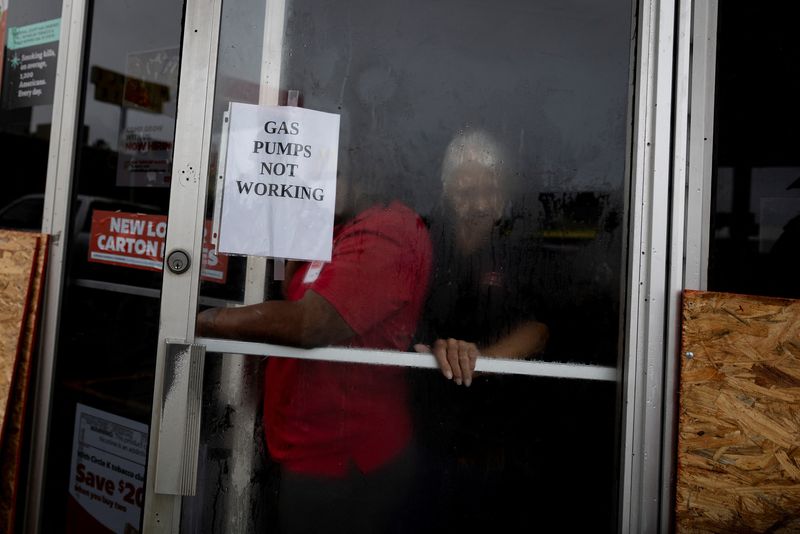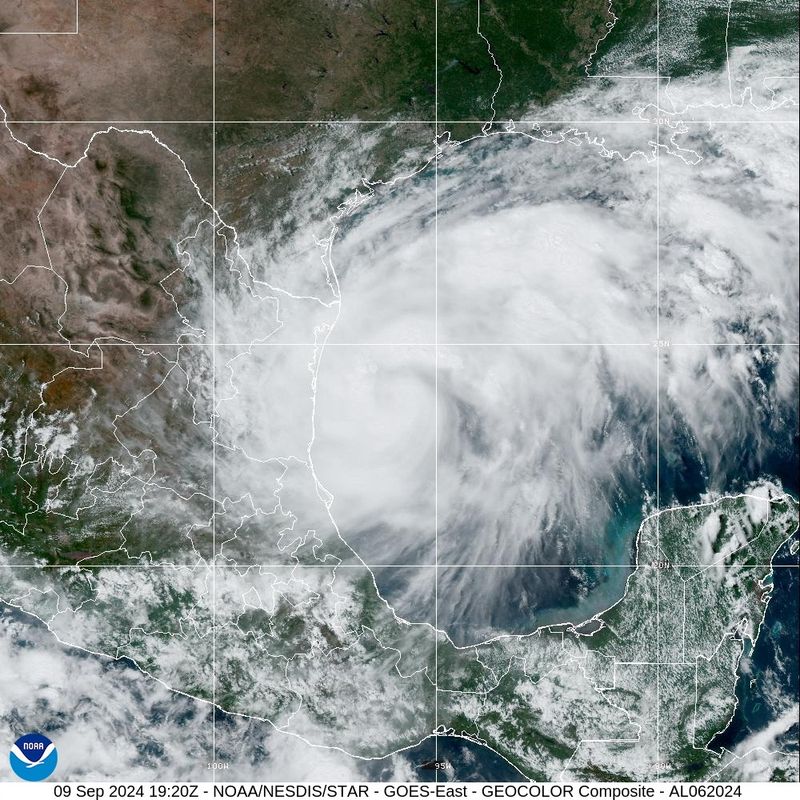By Gary McWilliams and Marianna Parraga
HOUSTON (Reuters) -Francine strengthened into a hurricane on Tuesday night, the U.S. National Hurricane Center said, as it prompted Louisiana residents to flee inland and oil and gas companies to shut in Gulf of Mexico production.
Francine was developing more slowly than earlier forecast but could still wallop the Louisiana coast on Wednesday with life-threatening winds, drenching rains and an up to 10-foot (3-meter) storm surge.
Maximum sustained winds reached 75 miles per hour (120 kph) on Tuesday night as the storm became a Category 1 hurricane on the five-step Saffir-Simpson scale, the hurricane center said.
The storm was moving off the southern Texas coast and expected to make landfall on Wednesday near Thibodaux in Louisiana. Its path promises a major test for liquefied natural gas (LNG) export plants recently built in the region.
Energy companies shut-in 412,070 barrels per day of oil production, about 24% of the U.S. Gulf of Mexico production, and evacuated staff from 130 production platforms, U.S. offshore regulator Bureau of Safety and Environmental Enforcement said on Tuesday.
About 494 million cubic feet per day, or 26% of Gulf natural gas production, was offline, according to reports submitted to the offshore regulator.
The region is home to about 15% of U.S. oil production and 2% of natural gas output.
U.S. natural gas prices rose about 3% on worries about the production shut-ins and potential impact on LNG plants. Global oil demand concerns overshadowed the storm and U.S. crude futures fell more than 4%.
Oil refiners and fuel distributors along the Louisiana coast were preparing to weather the storm. Citgo Petroleum said its Lake Charles oil refinery was implementing its hurricane plan.
The port of Brownsville near the border with Mexico and other smaller terminals in Texas remained closed on Tuesday, while other ports, including Houston, Galveston, Corpus Christi, Texas City and Freeport, were working with restrictions.
Between Texas and Louisiana, ports from Beaumont, to Plaquemines imposed restrictions to vessel traffic, the Coast Guard said.
In New Orleans, port officials were preparing to close its terminal and railroad operations, with service to resume on Thursday following damage assessments. Ports in Houma, Morgan City and the Louisiana Offshore Oil Port were closed to navigation, according to the U.S. Coast Guard.
Ports in Mississippi and Alabama, including Pascagoula also began storm preparations, but remained open on Tuesday. After landfall, the center of Francine is expected to move into Mississippi on Wednesday night or Thursday.
Oil producers Exxon Mobil (NYSE:XOM), Shell (LON:SHEL) and Chevron (NYSE:CVX) removed offshore staff and curtailed production. Pipeline operator Enbridge (NYSE:ENB) also pulled employees from several U.S. Gulf of Mexico platforms.
Louisiana is home to three of the country's seven big operating LNG export plants. New plants - Sempra's Cameron LNG, Venture Global LNG's Calcasieu Pass LNG and Tellurian (NYSE:TELL)'s Driftwood LNG development - are along the path of Francine.

Natural gas flowing to the Cameron LNG export plant dropped on Tuesday to 1.3 billion cubic feet per day (bcfd) from about 2.2 bcfd on Monday, LSEG data showed. Sempra did not reply to a request for comment.
Freeport LNG, which operates the nation's second-largest export plant for the super-chilled gas, said it had begun storm preparations at its Texas plant without providing details.
